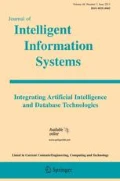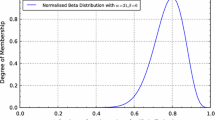Abstract
This paper investigates the possibility of performing automated reasoning in probabilistic knowledge bases when probabilities are expressed by means of linguistic quantifiers. Data are expressed in terms of ill-known conditional probabilities represented by linguistic terms. Each linguistic term is expressed as a prescribed interval of proportions. Then instead of propagating numbers, qualitative terms are propagated in accordance with the numerical interpretation of these terms. The quantified syllogism, modeling the chaining of probabilistic rules, is studied in this context. It is shown that a qualitative counterpart of this syllogism makes sense and is fairly independent of the thresholds defining the linguistically meaningful intervals, provided that these threshold values remain in accordance with the intuition. The inference power is less than a full-fledged probabilistic constraint propagation device but corresponds better to what could be thought of as commonsense probabilistic reasoning. Suggestions that may improve the inferencing power in the qualitative setting are proposed.
Similar content being viewed by others
References
Adams, E.W. (1975).The Logic of Conditionals, Dordrecht Riedel.
Aleliunas, R. (1988). A new normative theory of probabilistic log. InProceedings of 7th Biennial Conf. of Canadian Society for Computational Studies of Intelligence (AICSCSI'88) (R. Goedel, ed.), Edmonton, Alberta, Canada, June 6–10, 67–74.
Amarger, S., Dubois, D., and Prade, H. (1991a). Handling imprecisely-known conditional probabilities.In Proc. of the UNICOM Seminar “AI and Computer Power—The Impact on Statistics. Brunel Conf. Center, West London, March 13–14, 1991. 1–33, Final proceedings to be published by Chapman & Hall.
Amarger, S., Dubois, D., and Prade, H. (1991b). Constraint propagation with imprecise conditional probabilities. InProc. of the 7th Conf. on Uncertainty in Artificial Intelligence. Los Angeles, CA, July 13–15, 26–34.
Bacchus, F. (1990).Representing and Reasoning with Probabilistic Knowledge, Cambridge, MA: MIT Press.
Boole, G. (1854).The Laws of Thought, MacMillan, New York. (Reprinted by Dover, New York, 1958.)
De Morgan, A. (1966). “On the Syllogism” and Other Logical Writings. London: Routledge & Kegan Paul Ltd. (First published between 1846 and 1868.)
Dubois, D., and Prade, H. (1988). On fuzzy syllogisms.Computational Intelligence (Canada),4-2, 171–179.
Dubois, D., and Prade, H. (1991). “Conditional objects and non-monotonic reasoning. InProc. of the 2nd Inter. Conf. on Principles of Knowledge Representation and Reasoning (KR'91). Cambridge, MA., April 22–25, 175–185.
Dubois, D., Prade, H., and Toucas, J.M., (1990). Inference with imprecise numerical quantifiers. In Ras, Z.W., and Zemankova, M. (Eds.),Intelligent Systems—State of the Art and Future Direction. Ellis Horwood, 52–72.
Geffner, H. (1992),Default Reasoning: Causal and Conditional Theories. Cambridge, MA: MIT Press.
Ginsberg, M.L. (1988). “Multivalued logics,”Computational Intelligence, 4. pp. 265–316.
Goodman, I.R., Gupta, M.M., Nguyen, H.T., and Rogers, G.S. (Eds.) (1991).Conditional Logic in Expert Systems. Amsterdam: North-Holland.
Güntzer, U., Kieling, W., and Thöne, H. (1991). New directions for uncertainty reasoning in deductive databases. InProc. ACM SIGMOD Inter. Conf. on Management of Data, Denver, 178–187.
Heinsohn, J. (1991). A hybrid approach for modeling uncertainty in terminological logics. In Kruse, R., Siegel, P. (Eds.),Symbolic and Quantitative Approaches to Uncertainty (Proc. of the Europ. Conf. ECSQAU, Marseille, October, 1991), Lecture Notes in Computer Science, 548, Berlin Springer Verlag, 198–205. (Complete version: Research Report n° RR-91-24, Deutsches Forschungszentrum für Künstliche Intelligenz GmbH, Saarbrücken, Germany, 1991).
Kahneman, D., Slovic, P., and Tversky, A. (1980).Judgement under Uncertainty: Heuristics and Biases. New York: Cambridge University Press.
Neufeld, E. (1990). A probabilistic commonsense reasoner.Int. J. of Intelligent Systems, 5. 565–594.
Pearl, J. (1988).Probabilistic Reasoning in Intelligent Systems: Networks of Plausible Inference. San Mateo, CA: Morgan Kaufmann.
Peterson, P. (1979), On the logic of few, many and most.Notre Dame J. Formal Logic, 20, 155–179.
Quinlan, J.R. (1983). INFERNO, a cautious approach to uncertain inference.The Computer Journal, 26, 255–269.
Shapiro, S.C. (1979). Numerical quantifiers and their use in reasoning with negative information. InProc. of the 6th Inter. Joint Conf. on Artificial Intelligence (IJCAI'79), Tokyo, Japan 791–796.
Spies, M. (1989).Syllogistic Inference under Uncertainty. München, Germany: Psychologie Verlags Union.
Thöne, H., Güntzer, U., and Kieling, W. (1991). Probabilistic reasoning with facts and rules in deductive databases. In Kruse, R., Siegel, P. (Eds.),Symbolic and Quantitative Approaches to Uncertainty (Proc. of the Europ. Conf. ECSQAU, Marseille, October, 1991), Lecture Notes in Computr Science, 548, Springer Verlag, Berling, 333–337.
Thöne, H., Güntzer, U., and Kieling, W. (1992). Towards precision of probabilistic bounds propagation. In Dubois, D., Wellman, M.P., D'Ambrosio, B., and Smets, P. (Eds.),Proc. of the 8th Conf. on Uncertainty in Artificial Intelligence, Morgan and Kaufmann, 315–322.
Travè-Massuyès, L., and Piera, N. (1989). The orders of magnitude models as qualitative algebras. InProceedings of 11th Inter. Joint Conf. on Artificial Intelligence (IJCAI-89), Detroit, Michigan, Aug. 20–25, 1261–1266.
Van Benthem, J. (1986),Essays on Logical Semantic. Amsterdam: D. Reidel.
Wellman, M.P. (1988). Qualitative probabilistic networks for planning under uncertainty. In Lemmer, J.F., and Kanal, L.N. (Eds.),Uncertainty in Artificial Intelligence 2. Amsterdam: North-Holland, 197–208, 1988.
Wellman, M.P. (1990). Fundamental concepts of qualitative probabilistic networks.Artificial Intelligence.44, 257–303.
Westerstahl, D. (1989). Quantifiers in formal and natural languages. In Gabbay, D., and Guenthner, F. (Eds.),Handbook of Philosophical Logic, Vol. IV. Amsterdam: D. Reidel 1–131.
Xiang, X., Beddoes, M.P., and Poole, D. (1990). Can uncertainty management be realized in a finite totally ordered probability algebra. In Henrion, M., Shachter, R.D., Kanal, L.N., and Lemmer, J.F. (Eds.),Uncertainty in Artificial Intelligence 5. Amsterdam: North-Holland, 41–57.
Zadeh, L.A. (1985). Syllogistic reasoning in fuzzy logic and its application to usuality and reasoning with dispositions.IEEE Trans. on Systems, Man and Cybernetics, 15–6 754–763.
Author information
Authors and Affiliations
Additional information
This paper is an extended and revised version of a paper entitled “A Symbolic Approach to Reasoning with Linguistic Quantifiers” inProc. 8th Conf. Uncertainty in Artificial Intelligence Dubois, D., Wellman, M.P., D'Ambrosio, B., and Smets, Ph. (Eds.), Morgan Kaufmann, pp. 74–82, 1992.
Rights and permissions
About this article
Cite this article
Dubois, D., Godo, L., López De Màntaras, R. et al. Qualitative reasoning with imprecise probabilities. J Intell Inf Syst 2, 319–363 (1993). https://doi.org/10.1007/BF00961659
Issue Date:
DOI: https://doi.org/10.1007/BF00961659




